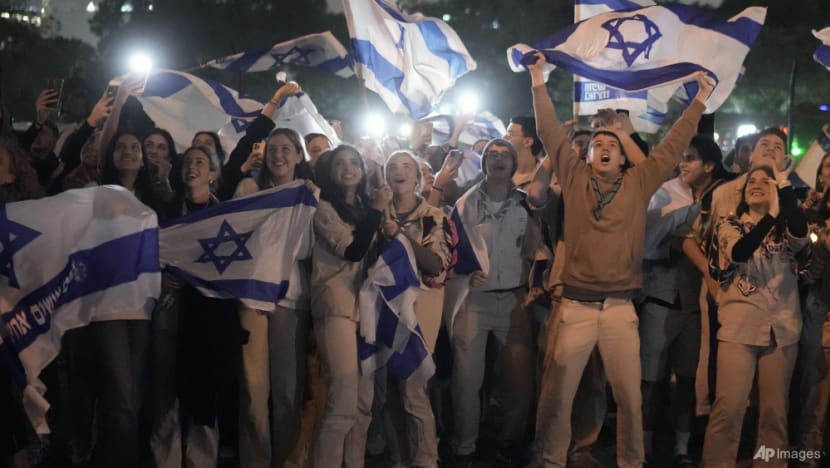Israel needs to choose between release of hostages, destruction of Hamas as both aims ‘incompatible’: Experts
An initial four-day truce between Israel and Hamas that was set to expire on Monday has been extended by two days, paving the way for the further release of Israeli hostages in exchange for Palestinian prisoners.


This audio is generated by an AI tool.
Israel needs to decide whether to prioritise the release of hostages from Hamas captivity or to seek the destruction of the group, as both aims are "incompatible", observers told CNA on Tuesday (Nov 28).
“I think what's key for the Israelis to succeed is to reframe their goal. It's not possible to end Hamas. Hamas is an ideology (and) it's a whole system of thinking,” Ms Laura Blumenfeld, senior fellow at the Philip Merrill Center for Strategic Studies at Johns Hopkins School for Advanced International Studies, told CNA938.
“But it might be possible to make Hamas irrelevant through peace negotiations, or to negotiate an unconditional surrender of Hamas.”
That would give Palestinian civilians a chance to form a new government which is “more constructive and looking for a more peaceful solution and better future for all”, she said.
An initial four-day truce between both parties that was set to expire on Monday has been extended by two days, paving the way for the further release of Israeli hostages in exchange for Palestinian prisoners.
It reflects a shift in Israeli Prime Minister Benjamin Netanyahu’s firm stance initially against a ceasefire, as he is faced with low approval ratings and pressure from the international community, said observers.
“Most importantly, it means that they're getting their people back,” Professor James Gelvin from the Department of History at University of California, Los Angeles, told CNA’s Asia First.
Terms of the initial truce had included the release of at least 50 hostages, with 150 Palestinian prisoners freed in exchange.
“For the Israeli government, the hostage issue has been extraordinarily important,” said Prof Gelvin, citing a 30,000-strong march from Tel Aviv to Jerusalem earlier this month, including families of hostages, calling for Mr Netanyahu to bring the hostages home.
There has also been a lot of pressure from the international community for a resolution to conflict, he added.
NETANYAHU’S SHIFT
Mr Netanyahu probably did not have any other option than to agree to a truce, said Prof Gelvin.
“He is extraordinarily unpopular at the present time. His approval ratings are in the single digits. He's under a great deal of international pressure about the war and the way the war is going,” he said.
Prof Gelvin said the Israeli leader’s aims of getting the hostages back while also seeking to destroy Hamas are incompatible.
“The Israelis have a real problem here. What they have to do is figure out which of the two they are going to go for first, if they are gonna go for both of them at the same time, or how they are going to try to square this circle,” he said.
Prof Gelvin said that both parties in the war are facing a great deal of external pressure, with Qatar is pressuring Hamas, and the United States and the international community pressuring Israel.
“The embrace of Israel by the Americans, I think, was a move that was made by (President) Joe Biden to make sure that the United States continued to have leverage over Israel in doing this,” he noted.
He added that the government of Israel is “between a rock and a hard place”.
“Is Israel going to occupy Gaza again? The Americans don't want that. Are they going to have the Palestinian Authority come in? They don't want that. So it's a very difficult decision to make,” said Prof Gelvin.
NEGOTIATIONS MOVING FORWARD
Prof Gelvin said Hamas has gained political advantage with the hostage-prisoner swap deal and extended truce.
He noted that Hamas is “not the most popular organisation in Gaza”, with protests against it in 2018, 2019, and recently in August this year, when people were unhappy with the wretched condition of the economy.
“Gaza has been able to pull a rabbit out of a hat with this one, because it's been able to demonstrate that its way of doing business has a greater potential for paying off benefits than the way the Palestinian Authority, which is in negotiations with the Israelis, has been able to do so,” said Prof Gelvin.
Moving forward, negotiations between the two sides are going to get harder, said Prof Gelvin.
Over time, Hamas is going to try to take advantage of the fact that the Israelis really want their hostages back, and they are going to negotiate as well as they can and “put Israel in a very difficult position”.
Ms Blumenfeld noted the complexity of the situation.
On one hand, the hostages give Hamas leverage as they can free their own prisoners.
However, from an international public image perspective, the pictures of children and babies held captive make for a “public relations disaster”, said Ms Blumenfeld.
“For the Israelis, it's almost the opposite. As long as there are hostages being held, it's heartbreaking… The minute those children are returned and the fighting resumes, then the Israelis are going to look like the bad guys,” she said.














